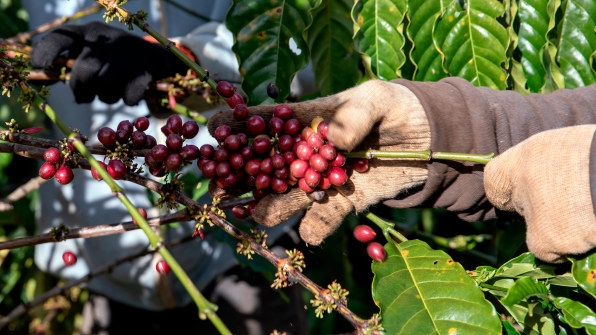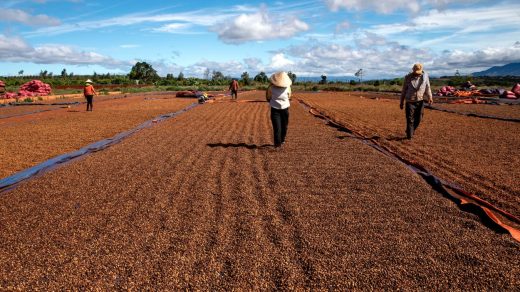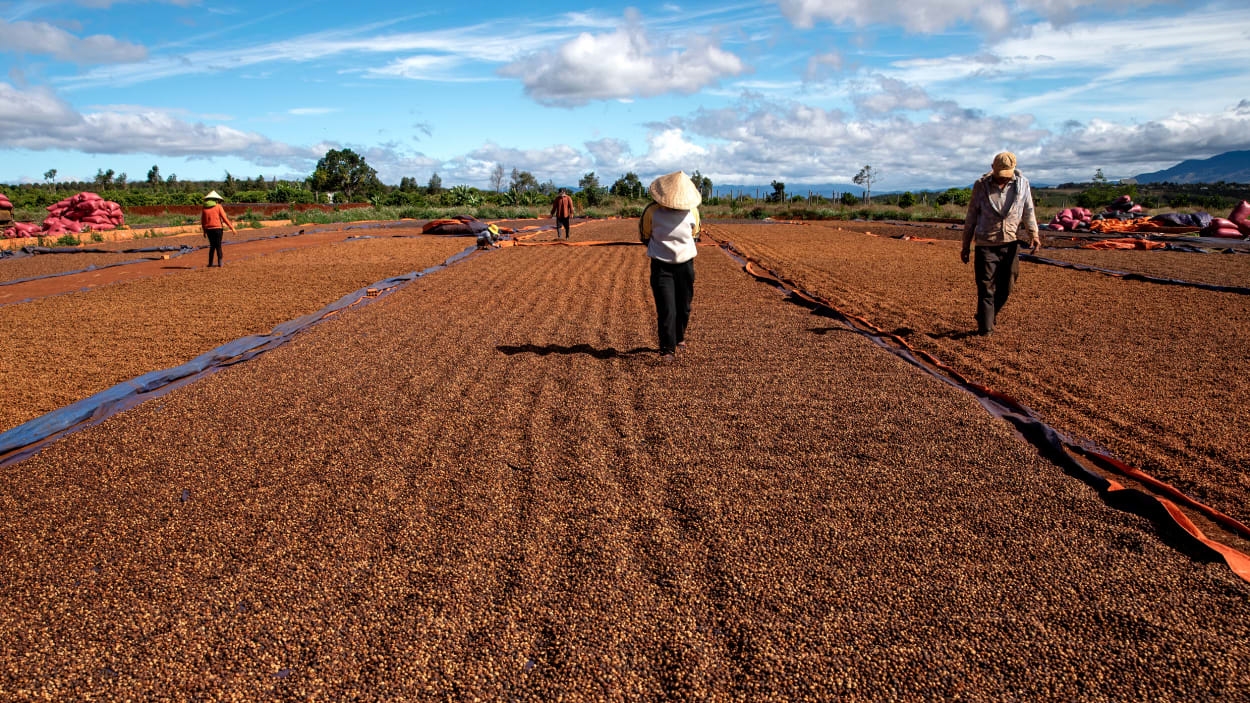Why Vietnam is about to be the next big thing in organic coffee
By Debbie Wei Mullin
Vietnam, the world’s second-largest coffee producer, is about to change the game for organic coffee. Many reading this might be surprised to learn that Vietnam even makes coffee, but trust me—you’re likely already drinking it. Even the biggest names in specialty coffee source a significant amount from Vietnam; that house blend from you-know-who is usually 40% Vietnamese beans, but no one dares to claim it.
Vietnam went from supplying 0.5% of the world’s coffee in 1984 to more than 18% in 2020. Vietnam is now the world’s leading robusta producer, one of the two major varietals that dominate the world’s coffee industry. Over the past 30 years, Vietnam’s government has incentivized farmers to grow and export coffee by providing everything from subsidized farming inputs such as seedlings and fertilizers to low-cost land.
Though exports from Vietnam grew, government policies also controlled coffee prices, which incentivized little to no improvement in the quality of the coffee, helping robusta earn its current reputation as the inferior bean. Robusta has served the industry as a “filler” coffee added only in secret to reduce cost (robusta generally sells for less than half the cost of its more popular cousin, arabica).
Vietnam has also become notorious for environmentally harmful coffee farming practices. Overuse of pesticides is well-documented, and while coffee supplies have grown, little environmental improvement has been done at scale for farming. When starting Copper Cow Coffee, I was unable to find even a single organic certified coffee farm in the country. In our supply chain, we had to first start with drastically reducing pesticides and chemicals on our farms, but it was challenging to get the farmers on board.
But all of that is about to change as the world’s perception of Vietnam’s coffee evolves, particularly by the largest consumer of organic and specialty coffee in the world: the United States. Additionally, Vietnam’s own growing middle class is more health-conscious and demanding more premium and organic products. These trends, coupled with governmental policies encouraging organic outputs, are going to push coffee farmers to go organic, as they learn that it won’t just leverage higher prices, but means their farming practices are better for their health and the environment.
Vietnam will follow in the footsteps of neighboring Asian emerging economies like China, which have leveraged their economic growth to become a major producer of organic products, and take advantage of fast-rising global demand. This will make organic coffee more accessible than ever.

Economy
Over the past 20 years, I have traveled to Vietnam regularly—first, with my mother on visits to her home country, and then regularly for my studies at MIT and career in sustainable development at the World Bank. I worked on everything from microfinance in farming to rural highway development in the pursuit of one aim: How can better opportunities be created in Vietnam so that people like my mother wouldn’t have to leave to fulfill their dreams as she did? In 2016, I took these learnings to start Copper Cow Coffee, the first premium Vietnamese coffee company focused on promoting sustainable supply chain practices.
Over the years, I watched as Vietnam became one of the fastest-growing economies in the world. Poverty rates dropped from 60% to 10%, and the country emerged as a powerful international business player. Industrial growth rose rapidly, as did the quality of manufactured goods, much like China’s experience a decade before. And just like in China—as Vietnam’s economy has grown, a health-conscious middle class has emerged willing to pay a premium for organic products.
Vietnam’s organic farming quadrupled from 2016 to 2020 and has struggled to keep up with demand. In 2020 alone, organic exports from the U.S. to Vietnam also quadrupled. Just as in China, Vietnam’s organic production will grow as farmers become more knowledgeable in organic farming methods, the prices they command, and the health benefits organic farming affords them and their land.
And why does organic matter? USDA organic—which requires farming without synthetic fertilizers, pesticides, herbicides, or fungicides—offers biodiversity and soil quality benefits, reduced pollution, and better health for consumers. These benefits have driven the world’s demand for organic products to grow from $57.2 billion in 2010 to $178.4 billion in 2021; that’s expected to grow to $497 billion by 2030.
The Organic Coffee Market Opportunity
In 2022, the organic coffee market was $8.9 billion, and it’s expected to grow to $28.8 billion by 2030, primarily driven by the U.S. market (which was valued at $3.4 billion in 2020). For years, robusta coffee (and therefore Vietnamese coffee) was viewed as an inferior bean, ruling it out of more expensive or premium cultivation practices and pickier consumers willing to shell out a 47% price premium for organic certified products.
But times have changed, and the world is learning that robusta is not inherently inferior to arabica. The New York Times touted it as the future of Vietnamese coffee. Even the biggest coffee snobs are subscribing to Vietnamese coffee, and you can find a variety of Vietnamese coffee options in stores from Whole Foods to Sprouts to Walmart.
Arabica has benefited from years of investment in quality improvements such as standards for measuring coffee cherry ripeness before harvesting, or innovation in coffee cherry removal that has been optimized for arabica—a journey robusta has only recently begun at scale. But robusta has many things to love about it, including its strong mocha and nutty undertones, which are perfect for dark roasting, and a larger bean size that makes it cheaper to grow per pound and per acre. Robusta is also a climate-resilient plant with high caffeine content that dissuades most pests—both of which make it perfect for organic conversion. That means that when it’s certified organic, it will make premium organic coffee cheaper than ever before.
Soon Vietnamese coffee will no longer be hidden in your cup; it will be part of an entire category in the premium and organic coffee market.
Debbie Wei Mullin is the founder of Copper Cow Coffee. She holds a BA in economics from the University of California, Berkeley, and a master’s degree in international development from the Massachusetts Institute of Technology.
(9)



